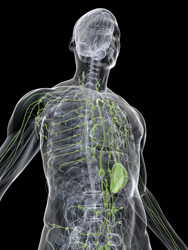Homeoprotein activity underlies lymphoid organogenesis
It is known that many oncogenes and tumour suppressors encode for transcription factors essential for regulating developmental processes. Most of the molecular mechanisms behind lymphoid organogenesis are still unknown, but recent research indicates that homeodomain transcription factors are essential to these processes. One such homeoprotein is Pbx1. This binds DNA with a subset of Hox proteins, including the Hox11 oncoprotein that is accumulated in T-cell acute leukaemia. The 'Roles of homeoproteins in lymphoid organ development' (Hinlod) project has so far used mouse models and cellular and biochemical approaches to describe the effects of Pbx1 and Hox11 activity. The researchers have established a genetic network regulating spleen mesenchymal expansion and were able to demonstrate the critical role of the Pbx1-Hox11 pathway during spleen ontogeny. The project's main objective has been to identify and characterise novel molecular networks regulated by oncogenic transcription factors during organogenesis. This has included a detailed search to identify growth-related target genes and regulatory networks governed by Pbx1 and Hox11 homeoproteins during lymphoid organogenesis. During the first 24 months of the project, the use of microarray analysis identified genes regulated by a set of oncogenic transcription factors during organ development. Also, a bioinformatic analysis was performed and team members identified potential target genes of those transcription factors. The project is currently working to validate target genes via reverse-transcription polymerase chain reaction (RT-PCR) and immunohistochemical analyses. Hinlod has succeeded in verifying several potential targets and uncovering developmental pathways controlled by the transcription factors under investigation. Study results show that some target pathways are associated with proliferation and differentiation of progenitor cells during organogenesis. The project's final goal is to arrive at an all-inclusive understanding of the genetic and transcription networks behind organ development. The project partners believe that if oncogenic transcription factor target genes and developmental pathways can be identified during organogenesis, this will enhance understanding of how activity at a molecular level induces cellular transformation and tumour progression.







